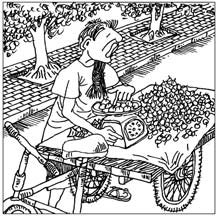
The lack of imagination some people show in managing their cities can be astonishing. For years we have read news reports from various cities about incomprehensible, sometimes inhumane, restrictions on roadside venders.
Most of them can be considered small business people, who earn only a fraction of what large offices and companies waste on a daily basis. In fact, many of these small vendors set up their humble stands only after they had lost their State-sector jobs.
Peddling things on the roadside is, after all, a poor people's business. City administrators should understand that. If they are as committed as they say they are to maintaining a harmonious society, they should be helping small venders earn a decent living rather than destroying one of the few ways they have for doing so.
On the contrary, we have on several occasions seen city administrators treating small venders like public enemies, chasing them out of virtually every corner of town - especially when those corners are near major business

streets.
Law-enforcement agents, both authorized and self-appointed, have been seen smashing and confiscating the property, most of it vegetables and other daily goods, of small businessmen and women. Despite all the work it took for the former to grasp the concept "civilized law-enforcement" (wenming zhifa - there is indeed such a phrase in Chinese), bizarre restrictions still abound.
Most of them exist on the grounds that small venders are individuals who do not belong to any organizations and are hard to manage. They tend to make a mess on the street. They slow down traffic. They sometimes sell counterfeits. And they usually do not pay business taxes.
But the irony is that in our cities and on the hundreds of roads that crisscross them (especially on those that connect to the countryside), there has never been a lack of small venders hawking all kinds of goods - from such small items as mobile phone cases and cheap textile goods, to unlicensed food stalls and goods bearing fake trademarks.
The restrictions are effective only at certain times, and in certain pockets of the city. And here they are most rigorously imposed. On the main commercial streets, they seem to function as de facto protections for shops owned by the State and large foreign investors rather than as tools of law-enforcement.
Considering this issue against the background of the steady decline in the number of individually owned businesses in recent years, it is clear that administrators in different cities should really be more rational in planning local commercial development, and more sympathetic to the individuals who are willing to seek a better life by doing some extra work.
In a medium-sized economy (by global standards), the annual loss of 870,000 self-employed people for two consecutive years - this is the figure reported in the media - would be an economic crisis. Even though officials with the State Administration for Industry and Commerce said the picture was not as bad as critics could assume, the number is still mind-boggling.
Law-reinforcement will remain one-sided and easily corruptible if it relies entirely on the government effort. It would be ideal if small businesspeople of various trades were allowed to form their own self-governing associations.
In return, trade associations would make it more convenient, not less, for the government to provide guidance to street venders and to work with them to combat illegal activities, such as violations of copyright laws and the selling of improperly processed foods.
E-mail: younuo@chinadaily.com.cn
(China Daily 09/24/2007 page4)

